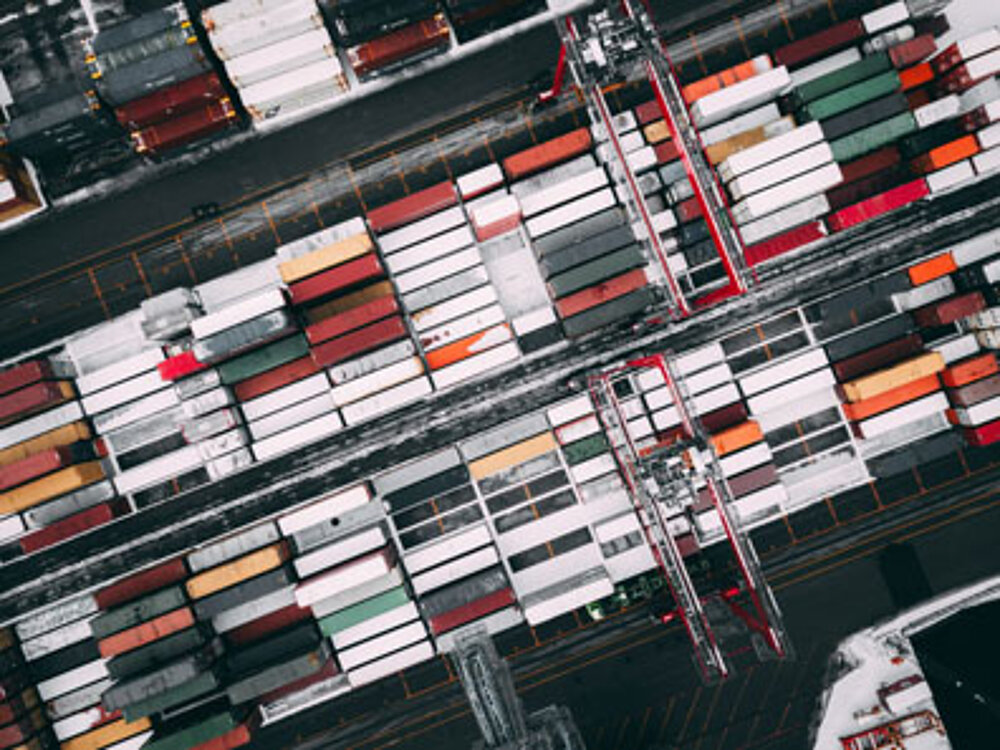Find out today what the legal world will be talking about tomorrow.
13.09.2021
The German Supply Chain Act is coming. What do foreign companies have to prepare for?

After heated debates, the German Bundestag passed the "Act on Corporate Due Diligence in Supply Chains" (also known as the "Supply Chain Act" or, more unwieldly, the "Supply Chain Due Diligence Act" (Lieferkettensorgfaltspflichtengesetz, LkSG)) on 11 June 2021. It intends to ensure that companies adequately address human rights and environmental risks within their supply chains and take appropriate countermeasures as well as preventive measures. When the LkSG comes into force on 01.01.2023, companies will have to comply with a number of additional obligations.
1. Applicability to foreign companies?
The LkSG does not only apply to German companies of any legal form with at least 3,000 (from 01.01.2024: 1,000) employees group-wide, but also to foreign companies of any legal form that maintain at least one branch office in Germany and employ at least 3,000 (from 01.01.2024: 1,000) employees group-wide in Germany, Section 1 (1) No. 2. Employees of these German entities who are posted abroad are to be included in the calculation. It is advisable for companies to ensure compliance with the obligations in good time, especially because of the possible draconian fines of up to 2% of total worldwide turnover in case of non-compliance.
2. Indirect effects on foreign companies
It is also clear that suppliers not covered by the LkSG, regardless of their own size and location, who supply large German companies will be affected in the future. This is because large German companies assumingly will pass on their obligations imposed on them by the LkSG to a considerable extent. Please see below under point 4.
Therefore, companies that are not covered by the LkSG should deal with the possible effects and challenges of the LkSG at an early stage. It is to be expected that companies with implemented LkSG compliance systems will be able to draw a competitive advantage from this in the future.
3. Obligations of foreign companies in the case of direct applicability
The following paragraphs provides an overview of what companies will have to prepare for in the future after the LkSG comes into force if they operate with at least one branch in Germany and employ at least 3,000 (from 01.01.2024: 1,000) employees throughout the group in Germany.
3.1 Duty of care for human beings and the environment
Section 3 of the LkSG obliges companies to behave in a reasonably careful manner with regard to human rights and environmental law and establishes a catalogue of duties in this respect. This is specified in more detail in Sections 4-10.
However, companies are only subject to a duty of “care”. This means that the company is not obliged to actually prevent any human rights and environmental laws violations. The company only has to take reasonable efforts to minimise the risk of such violations. In other words, it must take reasonable precautions and measures.
3.2 “Risks”
The human rights risks which companies must adequately address are listed in Section 2(2) Nos 1-11. Section 2 para. 2 no. 12 contains a general clause regarding other human rights risks. The environmental risks addressed by the Act are listed in Section 2 para. 3 nos. 1-8.
3.3 Risk management
Pursuant to Section 4, companies must introduce an appropriate risk management system in order to identify risks, prevent the realisation of any risks as well as minimise and stop violations. Companies must appoint a responsible person, such as a human rights officer. The management must regularly inform itself about the work of the human rights officer.
As part of risk management, an appropriate risk analysis must be carried out at least once a year (and, if necessary, additionally on an ad hoc basis) in order to identify, appropriately weight and prioritise the risks in the company's own business area and at its direct suppliers. The results of the risk analysis must be communicated to the relevant decision-makers. These must take the results into appropriate consideration (§ 5).
The act only considers specific suppliers. According to Section 2 (7), suppliers are contractual partners whose supplies are necessary for the manufacture of the product or the provision of a service. Accordingly, large companies are not obliged to analyse risks at its direct suppliers with regard to the resale of unmodified products - and this applies even if they become aware of violations of human or environmental rights. According to a spokeswoman of the Federal Ministry of Labour and Social Affairs, which was involved in the draft law, such cases are also to be covered. How the courts will address this issue is uncertain.
The process of risk analysis is not specified by the LkSG. However, the explanatory memorandum to the Act recommends proceeding in two stages. In the first stage, an overview of the company's own processes for the procurement of goods and services can be obtained by means of a risk mapping. Locations and business areas of the company and their following risks as well as the respective direct suppliers (conditions at the supplier's location, such as political framework conditions, product-related risk factors, endangered groups of people, working conditions, etc.) could be main categories of such risk map. The risks identified in this way are then to be evaluated and prioritised if necessary. The prioritization will be determined primarily on the basis of the type and extent of the respective risk and the possible influence.
3.4 Duty to take preventive measures against identified risks
If the company identifies a risk through the risk analysis, it must immediately take appropriate preventive measures (§ 6):
If it does not have a policy statement, one must be issued (§ 6 (2)). This must contain various elements of a human rights strategy, including a description of the process by which the company fulfils its due diligence obligations, the relevant risks identified for the company based on the risk analysis, and the human rights-related expectations set out by the company for its own employees and suppliers in the supply chain.
Further appropriate prevention measures in the own business area (§ 6 (3)) are in particular
- Implementation of the human rights strategy set out in the policy statement,
- The development and implementation of risk-minimizing procurement strategies and purchasing policies,
- The implementation of training courses,
- Control measures.
Appropriate preventive measures must also be taken with regard to the company's own suppliers (§ 6 (4)), in particular
- The consideration of human rights and environmental expectations in the selection of contractors,
- The contractual assurance of a direct supplier that it complies with the required human rights and environmental standards and adequately addresses them along the supply chain,
- The establishment of appropriate contractual control mechanisms and training,
- The implementation of risk-based control measures.
The effectiveness of prevention must be reviewed once a year (and additionally on an ad hoc basis if necessary).
3.5 Duty to remedy violations of human rights and environmental laws
If the company determines that a violation has already occurred or is imminent in its own business area or at a direct supplier, it is obliged to take appropriate remedial action without delay (§ 7 (1)). If the violation relates to a direct supplier and cannot be remedied in the foreseeable future, a concept for minimization and avoidance must be implemented (§ 7 (2)). A temporary suspension of business relations is also to be considered as a measure (§ 7 (2) No. 3).
3.6 Establishment of an anonymous complaints procedure
Furthermore, the company is obliged to set up an internal complaints procedure (§ 8). It is also possible to participate in an external complaints procedure instead. Here, existing whistleblowing systems can be used as a starting point. If such has to be set up or amended, we will be happy to help. The confidentiality of the user’s identity must be maintained. Employees of indirect suppliers (i.e. companies with which there is no direct business relationship and which are further down the supply chain) must also be enabled to use this complaints office (Section 9 (1)). The effectiveness of the complaints procedure must be reviewed at least once a year and on an ad hoc basis (§ 8 (5)).
3.7 Obligations with regard to indirect suppliers
If the company obtains substantiated knowledge of a possible violation of human rights or environmental law at an indirect supplier, the company is obliged, among other things,
- to carry out a risk analysis,
- establish appropriate preventive measures vis-à-vis the supplier,
- and to create and implement a concept minimising and preventing the violation,
- update the policy statement as appropriate.
3.8 Documentation and reporting obligations
The company is subject to documentation obligations (§ 10). The company must therefore document all preventive and remedial measures taken as well as the risk analyses carried out and keep the documentation for at least 7 years. In addition, a report must be submitted annually to the Federal Office of Economics and Export Control (§§ 10, 12, 19).
3.9 Right to litigate for trade unions and NGOs, civil liability
Section 11 provides that a person who claims to have been injured in a legal position of paramount importance by a breach of a corporate duty of care is entitled to authorise trade unions and non-governmental organisations to take legal action (special litigation status). This is intended to facilitate enforcement or make it possible in the first place.
However, the LkSG does not regulate civil liability for the violation of duties of care under the law. This does not mean, however, that civil liability cannot exist in individual cases, as the general elements of liability remain unaffected, Section 3 para. 3. The LkSG is not, however, intended to constitute a protective law within the meaning of Section 823 para. 2 BGB.
3.10. Administrative control and enforcement
Sections 14-21 regulate official control and enforcement and assign the Federal Office of Economics and Export Control the right to issue appropriate and necessary orders and measures to eliminate and prevent violations of the obligations under the Act. In addition, rights of access, obligations to provide information, and obligations to tolerate and cooperate are granted, among other things.
3.11. Exclusion from the award of public contracts
Section 22 provides that a company which has been fined for an infringement by a final decision shall be excluded for a reasonable period from participating in any award procedure for supply, construction or service contracts.
3.12. Penalties and fines
Section 23 permits the imposition of periodic penalty payments of up to EUR 50,000, while Section 24 permits the imposition of fines for violations of the LkSG. The fines may be calculated as a percentage of the company's total worldwide turnover for companies with an annual turnover of more than EUR 400 million, up to an amount of 2%.
4. Indirect effects on suppliers abroad
However, foreign companies which are not covered by the LkSG due to the lack of a German branch, are also affected by the LkSG. It can be assumed that large companies will impose obligations on their suppliers as a consequence of the act.
This follows, among other things, from the fact that the covered companies (i.e. large German companies) are required to carry out a risk analysis. This risk analysis relates to risks in the own company and with the direct suppliers, but not with the indirect suppliers. The large German companies will therefore take a closer look at their direct foreign suppliers (if applicable also: suppliers of unmodified resale products see above under point 3.3.).
If the analysis reveals risks, large companies are obliged to take preventive measures.
This applies accordingly if the large enterprise obtains knowledge of a possible violation of a protected legal position by other means - but then: substantiated. These preventive measures include, for example, the "consideration of human rights-related expectations in the selection of the direct supplier" and "the contractual assurance of a direct supplier that it complies with the (...) required human rights-related and environmental requirements and adequately addresses them along the supply chain".
It can be assumed that large German companies, which are subject to the obligations of the LkSG, will in future also expect to a greater extent their foreign suppliers and subcontractors to take preventive measures themselves, which the large companies will prescribe. Of course, this is already the case.
However, this will undoubtedly become more important and the requirements for such preventive measures or programmes will increase. Those who cannot or do not want to fulfil this must expect to be replaced by others.
5. Outlook: EU directive already in the pipeline
At the European level, efforts have been made for some time to harmonise the different human rights and environmental protection regulations within the supply chain in the member states. On 10 March 2021, the European Parliament submitted a proposal for a directive in this regard. This proposal largely coincides with the provisions of the LkSG, but in part goes beyond them. For example, the proposed directive no longer differentiates between direct and indirect suppliers. A draft directive from the Commission is still awaited. The Member States also have to find a mutual position on this.
The supply chain management, also with regard to compliance with human rights and environmental law, will therefore continue to gain in importance in the future and play an increasingly important role in corporate organisation and international competition. Particularly due to the possible directive and its implementing acts in the member states, there will hardly be any way around effective management of human rights and environmental risks for suppliers abroad.


